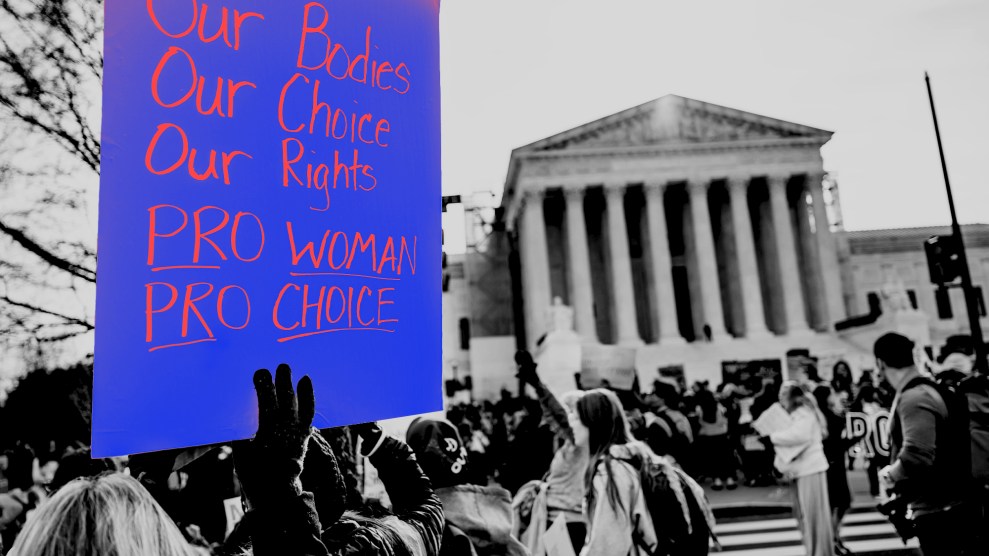
Demonstrators outside the Supreme Court in March.Eric Kayne/ZUMA
One of Donald Trump’s greatest political liabilities as he seeks to return to the White House is his position on abortion. Just last month, Trump rolled out a new stance in an attempt to neutralize the issue, switching from support for a national ban to leaving its legality up to the states. “Whatever they decide must be the law of the land, and in this case, the law of the state,” Trump said.
But a new survey by the progressive polling group Navigator Research, shared first with Mother Jones, indicates that voters do not trust Trump’s commitment to his new state-based policy—and show that President Joe Biden’s campaign can continue to use the abortion issue to peel voters away from Trump.
When it comes to abortion, to borrow a phrase, it appears that people are taking the ex-president seriously but not literally. Some 65 percent of voters now believe that Trump opposes abortion—a number that is eight points higher than Navigator found last September. Additionally, 55 percent of respondents believe, despite his suggestions of the opposite, that Trump would sign a national abortion ban if Congress passed one. After being read several of Trump’s comments on abortion, that number went up to 62 percent.
Trump has changed his mind so often on the issue it’s natural that voters would be skeptical that his latest pronouncement delegating abortion to the states is his final answer. Trump was famously for abortion rights before he was against them. As a private citizen in 1999, he claimed to be “very pro-choice.” But during his 2016 campaign, he changed his tune, even briefly floating criminal punishment for women who had abortions. He promised to appoint Supreme Court justices who would overturn Roe v. Wade—and came through on the commitment, which has allowed him to boast of bringing about the unpopular Dobbs ruling that ended the right to abortion. As a candidate this year, Trump privately expressed support for a national ban at 16 weeks, and in March publicly suggested a ban at 15 weeks. Finally, last month, he released a video in which he again took credit for overturning Roe and said the issue should remain up to the states.
The Navigator Research poll found that Trump’s new state-based position is not actually popular. According to the survey, 57 percent of respondents—including 62 percent of independents—prefer that abortion to be legal nationwide rather than left up to the states. The numbers reaffirm that leaving draconian state bans in place across the country is unpopular, says Rachael Russell, associate director of polling and analytics for Navigator. Voters “don’t see that as moderate. It’s evident to people that what is happening at the state level is not moderate.”
When Trump’s announced his state-by-state position, the Biden campaign rushed to point out how Trump’s approach greenlit the near-total abortion bans enacted in the post-Roe era. “Donald Trump is endorsing every single abortion ban in the states, including abortion bans with no exceptions,” the campaign’s director of rapid response Ammar Moussa, posted on X shortly after Trump’s roll out. “And he’s bragging about his role in creating this hellscape.”
Hours later, the Biden campaign released an ad featuring Amanda Zurawski, a Texas woman who nearly died after she was denied abortion care when her water broke at 18 weeks pregnant. Zurawski not only lost her pregnancy, but the delay in care resulted in three days in the ICU with sepsis and put her future fertility at risk. “Donald Trump did this,” the ad claims. In the coming months, Politico recently reported, the Biden campaign plans to run similar spots featuring other women denied abortion care—and blaming Trump for what happened to them.
Trump and his advisers had been looking for a way to blunt such attacks from the Biden campaign by moving away from a national abortion ban. Yet Navigator Research’s findings suggest last month’s announcement didn’t achieve that goal—at least not yet.
It’s not hard to guess why voters aren’t convinced. In an interview with Time magazine published last week, after the poll was conducted, Trump did not promise to veto a national ban. Instead he hedged by claiming that Congress wouldn’t pass one, while refusing to say what he would do if it did. Trump even allowed that states could track women’s pregnancies in order to prosecute them if they have abortions, a chilling indication of what his laissez-faire approach might bring about. He also teased that he would soon be clarifying his position on access to the abortion drug mifepristone as well as the Comstock Act, an 1873 law that Trump’s allies intend to use to ban abortion nationwide.
Furthermore, Trump has qualified his own position as supporting—but not requiring—exceptions for rape, incest, and the life of the mother. Notably, that leaves out the exceptions for the pregnant person’s health. As is already the case around the country, the lack of a health exception is leading to dire health emergencies and serious harms to pregnant people. Altogether, Trump is putting out a deeply anti-abortion vibe and most voters seem to be picking up on it.
But not every voter has reached that conclusion, with 19 percent of respondents to the poll—including 39 percent of independents—saying they weren’t sure if Trump would enact a national ban or not. That leaves an opening for Trump to come across as more moderate by persuading voters he would not sign such a nationwide ban. But it also means Biden has an opportunity to define Trump on an issue of significant importance to the electorate.
The Navigator poll, which will be released Wednesday, found that voters are willing to oppose a candidate based on their view on abortion. When asked what issues will guide how they vote, inflation was the top response, followed by jobs and the economy. But when the question was tweaked to ask “Which of these issues would prevent you from voting for a candidate, if the candidate held the opposite view” the most common response was abortion.
Since Dobbs, the Republican Party’s opposition to reproductive freedom has dragged the party down in election after election. It continues to be a serious weakness for Trump. The Biden campaign has six months to try to repeat Democrats’ recent string of successes by tying their opponent to a future with limited or eliminated reproductive rights.
















